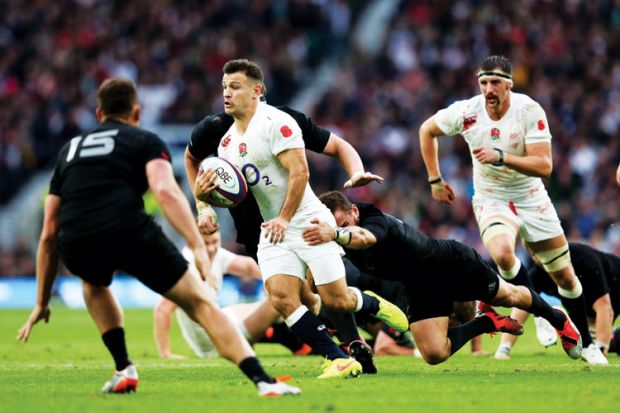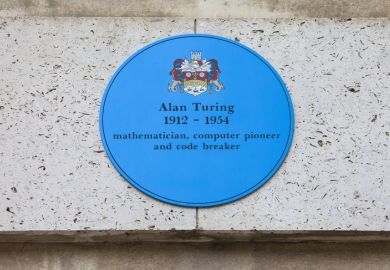This Saturday, the final of the Rugby World Cup will be played at English rugby union’s headquarters in Twickenham, southwest London, in a frenzy of media coverage. The day after, to much less media fanfare but every bit as much passion from their supporters, the England rugby league team will kick off a Test series against New Zealand in Hull.
The juxtaposition in the same weekend of the two codes will reinforce the fact that rugby is “still steeped in the legacy and memory of the past in a way that other sports aren’t”, according to Tony Collins, professor of history in the International Centre for Sports History and Culture at De Montfort University.
Professor Collins, often regarded as rugby’s leading historian, is author of The Oval World: A Global History of Rugby, published in August, as well as works including Rugby’s Great Split: Class, Culture and the Origins of Rugby League Football.
Why research the history of rugby? The sport “reflects very closely the preoccupations of British society and those societies that modelled themselves on the British”, Professor Collins said. “So class plays an absolutely central role in the development of rugby, most particularly through the 1895 split that led to the creation of two types of rugby: league and union.
“It’s vital in the creation of a British sense of masculine identity, particularly middle-class masculine identity.”
Professor Collins continued: “The role that rugby has played in the so-called former ‘white dominions’ of the British Empire – Australia, New Zealand, South Africa and, in a slightly different way, Canada – has been absolutely central to their sense of national identity and particularly, again, masculine identity.”
One part of rugby history Professor Collins has investigated is the William Webb Ellis myth, which holds that the schoolboy picked up the ball and ran with it during a match at Rugby School in 1823, thus inventing rugby.
The myth lives on: the winner of the Rugby World Cup will be awarded the Webb Ellis Cup. The tournament’s opening ceremony included a film – with a cast including Prince Harry – imagining the Webb Ellis moment.
In Professor Collins’ argument, there is no evidence to suggest it ever happened. The Webb Ellis story first emerged in 1877 and did not gain any traction until 1895, when it was taken up by an inquiry conducted by the Old Rugbeian Society (the old boys society for Rugby School) into the origins of rugby, he said.
“The key point is that the inquiry was set up in 1895, the year that rugby split,” he added.
The split came after those running rugby’s governing body insisted on amateurism, fending off the challenge of those who ran clubs in the industrial north, who demanded the right to pay players compensation for time missed at work to play the game. The northern clubs’ players were largely working-class and needed leave from their jobs to play matches.
In Professor Collins’ argument, the rugby authorities were appalled at the prospect of clubs with working-class players rising to dominate the game, as had quickly happened in association football after professionalism was legalised in 1885.
He said: “The [Webb Ellis] myth was taken up so rapidly [after 1895] because it appeared to justify the claims of the leadership of the rugby union that the sport was indeed a game that was really the property of the upper middle classes, the public school-educated men who were running the Rugby Football Union at that time; and that the clubs in the North of England based in the industrial cities, whose players and supporters were overwhelmingly working-class, that they were really outsiders who were trying to take over the game.”
Professor Collins’ books contain figures on the schooling of national team members from the two rugby codes. “Historically, over 70 per cent of the England [rugby union] team have been from private schools,” he said. In contrast, in the first 100 years of rugby league, just five private school-educated men played for the national team.
“That’s a consequence of what happened in 1895,” he added.
For Professor Collins, “rugby is living proof of what William Faulkner said: ‘The past isn’t over. It’s not even the past.’”
On rugby league, he said: “We’re living in an era when traditional working-class institutions are in decline: trade unions and other forms of working-class culture.” But rugby league “still retains that predominantly working-class base where it draws its spectators and players from”, along with an enduring set of cultural attitudes as a result.
This makes it “a very fertile area of study for academics who are interested, not necessarily in sport, but…things like working-class masculinity, working-class sense of community, locality”, Professor Collins added.
One of his fascinations is how rugby shows people using sport “to tell narratives” about their vision of society. Rugby union and rugby league, he said, “have very different conceptions of what society is about and how it should be”.
POSTSCRIPT:
Print headline: Expect some top-class rugby – and working-class, too
Register to continue
Why register?
- Registration is free and only takes a moment
- Once registered, you can read 3 articles a month
- Sign up for our newsletter
Subscribe
Or subscribe for unlimited access to:
- Unlimited access to news, views, insights & reviews
- Digital editions
- Digital access to THE’s university and college rankings analysis
Already registered or a current subscriber? Login




